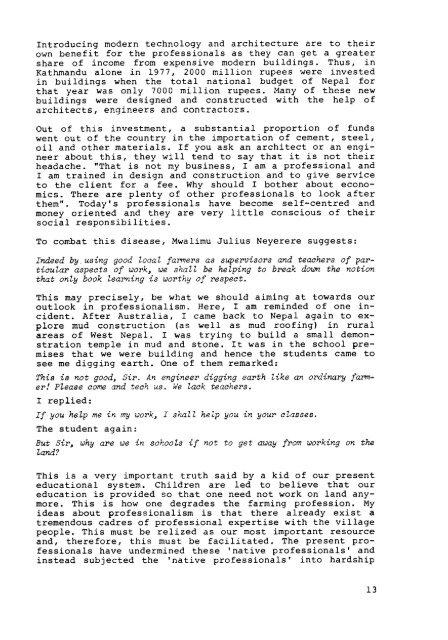Ifda dossier 47, May/June 1985
Ifda dossier 47, May/June 1985
Ifda dossier 47, May/June 1985
You also want an ePaper? Increase the reach of your titles
YUMPU automatically turns print PDFs into web optimized ePapers that Google loves.
Introducing modern technology and architecture are to their<br />
own benefit for the professionals as they can get a greater<br />
share of income from expensive modern buildings. Thus, in<br />
Kathmandu alone in 1977, 2000 million rupees were invested<br />
in buildings when the total national budget of Nepal for<br />
that year was only 7000 million rupees. Many of these new<br />
buildings were designed and constructed with the help of<br />
architects, engineers and contractors.<br />
Out of this investment, a substantial proportion of funds<br />
went out of the country in the importation of cement, steel,<br />
oil and other materials. If you ask an architect or an engi-<br />
neer about this, they will tend to say that it is not their<br />
headache. "That is not my business, I am a professional and<br />
I am trained in design and construction and to give service<br />
to the client for a fee. Why should I bother about econo-<br />
mics. There are plenty of other professionals to look after<br />
them". Today's professionals have become self-centred and<br />
money oriented and they are very little conscious of their<br />
social responsibilities.<br />
To combat this disease, Mwalimu Julius Neyerere suggests:<br />
Indeed by.using good local farmers as supervisors and teachers of par-<br />
ticular aspects of work, we shall be helping to break down the notion<br />
that only book learning is worthy of respect.<br />
This may precisely, be what we should aiming at towards our<br />
outlook in professionalism. Here, I am reminded of one in-<br />
cident. After Australia, I came back to Nepal again to ex-<br />
plore mud construction (as well as mud roofing) in rural<br />
areas of West Nepal. I was trying to build a small demon-<br />
stration temple in mud and stone. It was in the school pre-<br />
mises that we were building and hence the students came to<br />
see me digging earth. One of them remarked:<br />
This is not good, Sir. An engineer digging earth like an ordinary farm-<br />
er! Please come and tech us. We lack teachers.<br />
I replied:<br />
If you help me in my work, I shall, help you in your classes.<br />
The student again:<br />
But Sir,<br />
land?<br />
are we in schools if not to get sway from working on the<br />
This is a very important truth said by a kid of our present<br />
educational system. Children are led to believe that our<br />
education is provided so that one need not work on land any-<br />
more. This is how one degrades the farming profession. My<br />
ideas about professionalism is that there already exist a<br />
tremendous cadres of professional expertise with the village<br />
people. This must be relized as our most important resource<br />
and, therefore, this must be facilitated. The present pro-<br />
fessionals have undermined these 'native professionals' and<br />
instead subjected the 'native professionals' into hardship
















